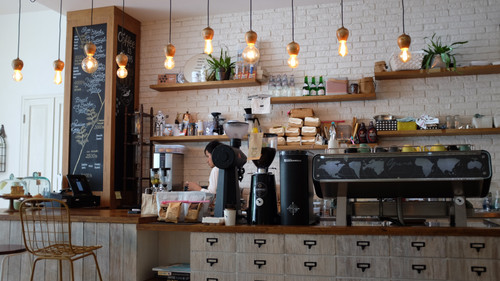Summer Café Culture in the US & UK
Posted by Aless on 21st Jul 2025
Summer. It's the season for sunshine, holidays, and, undeniably, the vibrant hum of café culture. With more people seeking connection and productivity in the open air, cafes are thriving as hubs for both social interactions and business meetups during these sun-drenched months. As streets and pavements fill with the enjoyment of morning brew or remote working al fresco, one trend continues to rise with the temperature: reusable coffee cups.
Outdoor Dining and Café Culture
Cafés have evolved from mere coffee dispensaries into important social havens, places where communities converge, ideas spark, and connections are forged. This transformation has driven a noticeable surge in outdoor dining and café culture, particularly during the warmer months. As urban spaces adapt to lifestyle shifts, sidewalk seating, rooftop terraces, and garden-style patios have become defining features of modern cafés, reflecting the broad consumer shift toward immersive, locally rooted coffee experiences.
Statistics paint a compelling picture of this growth. For example in the UK, the number of coffee shops has increased to over 10,000 venues in 2024, representing a 9.2% increase from last year, with the market worth over £5.3 billion according to the World Coffee Portal. Comparatively, in the US, there was over 40,000 coffee shops, with the coffee shop market occupying a value of USD$49.5 billion, growing 8% from last year.
Coffee Culture in the US
American coffee culture is a rich blend of tradition, innovation, and local flavour. From the earliest coffee houses in colonial times to the explosive growth of Starbucks in the late 20th century, coffee has long held a central place in the country’s social and economic identity. Starbucks, with its instantly recognisable green siren and dependable experience, helped define what many Americans expect from a coffee shop, setting the stage for a much broader and more diverse café landscape to emerge.
However, coffee in the U.S. is far from one-size-fits-all. Coffee culture in the United States is diverse and evolving, shaped by regional tastes and growing consumer awareness of quality and ethics. The Pacific Northwest stands out for its focus on ethically sourced beans and precise brewing methods, while other regions often favour sweeter, more indulgent coffee styles. While traditional drip coffee remains popular, there is a clear shift toward more sophisticated beverages, such as cold brew and espresso-based drinks, reflecting a maturing palate among American coffee drinkers.
By 2025, the American café scene is defined by lifestyle and sustainability priorities. Cold brew maintains its popularity due to its smooth flavour and low acidity, appealing to a broad range of consumers. Meanwhile, the flat white, has gained traction as an alternative to the latte, especially among those seeking a stronger coffee flavour. Accompanying these trends, plant-based milk alternatives, like oat and almond milk, have become widely available, driven by health concerns and increasing environmental awareness.
Transparency in sourcing is vital to coffee drinkers who favour cafés committed to fair trade and direct relationships with farmers. This ethical focus is embodied in the growing “third-wave” coffee movement, which emphasises single-origin beans, small-batch roasting, and artisanal brewing techniques. These trends illustrate how American coffee culture is becoming more conscientious, reflecting deeper connections between coffee, personal values, and lifestyle choices.
Reusable Cups in US Coffee Culture
Environmental awareness is increasingly influencing consumer behaviour in the U.S., especially within the coffee industry. One of the most visible outcomes of this shift is the growing trend toward reusable alternatives over single-use cups. According to a recent survey by McKinsey & Company, over 60% of American coffee drinkers express concern about the environmental impact of disposable cups and stated they would pay more for sustainable packaging, visualised in a rising number of people now owning and regularly using reusable cups.
In response, some coffee shops across the country are responding by actively encouraging sustainable habits by offering financial incentives. Many now offer discounts ranging from $0.10 to $1.00 for customers who bring their own reusable cups, while others have introduced loyalty rewards or exchange programs like HuskeeSwap to support a more sustainable future. While these amounts may be small, consistent savings are proving effective, particularly among regular coffee drinkers looking to reduce both waste and daily expenses.
Public education and awareness play a key role in reinforcing behaviour change. Social media campaigns have amplified the environmental cost of single-use cups, while initiatives from local governments, environmental groups, and businesses help normalise reusable alternatives. Huskee is a strong example, with a reusable cup system that combines sustainability and convenience. Through cup-swap programs and incentives, it makes participation easy and helps embed better habits into daily routines.
Coffee Culture in the UK

The UK's coffee culture is a mix of tradition and innovation, shaped by both historical influences and modern global trends. While tea continues to hold a cherished place in British hearts, coffee has steadily gained popularity, becoming an part of everyday life for many. Initially shaped by continental European traditions, particularly the Italian espresso bar model, the UK embraced a practical approach to coffee. However, the emergence of global coffee trends and the growing influence of the speciality coffee movement have brought new energy, variety, and sophistication to the nation's café culture.
In comparison to other European countries, the UK's consumption habits present a dynamic picture displaying a distinctive combination of high-volume consumption and evolving tastes, driven by a growing interest in both traditional espresso-based drinks and emerging specialty brews.
Espresso-based drinks such as lattes, cappuccinos, and flat whites remain staples, but there is a noticeable popularity of filter coffee and alternative brewing methods like pour-over and Aeropress. This shift reflects a broader curiosity among British consumers. Influential figures such as James Hoffmann, have played a pivotal role in shaping this evolution, advocating for greater transparency, sustainability, and a deeper appreciation of the craft behind each cup.
Reusable Cups in UK Coffee Consumption
Similar to the US, the increasing adoption of reusable cups is reshaping coffee consumption habits across the UK. Each day, according to Earth Action North Devon, up to 7 million disposable cups are thrown away, totalling around 2.5 billion per year. Yet, it was found that only 24% of takeaway coffee drinkers routinely bring a reusable cup. In response, public awareness campaigns and government guidelines have raised consciousness about single-use waste and spurred action.
Retailers have stepped in to reinforce this shift with powerful financial incentives. Discounts ranging from 10p to £1 per drink for reusable-cup users, paired with loyalty rewards and exclusive offers, are proving effective in encouraging sustainable behaviour. Many cafes are seeking certifications such as the Fairtrade mark or Rainforest Alliance certification to demonstrate their commitment to ethical sourcing. They're also adopting innovative strategies such as using compostable takeaway containers, reducing water consumption, and partnering with local suppliers to minimise their carbon footprint.
The Role of Technology and Innovation in Café Operations
Technology and innovation are revolutionising café operations, transforming everything from customer experience to back-end efficiency. Mobile ordering and payment solutions streamline the ordering process, reducing wait times and enhancing convenience. Automated coffee machines ensure consistency and precision, freeing up baristas to focus on customer interaction. For US coffee drinkers, this could benefit their fast and on the go coffee culture.
Technology will enable even more personalized coffee experiences, leveraging data analytics to tailor recommendations and optimise brewing methods for individuals. Virtual reality may also get involved, allowing customers to "visit" coffee farms or explore different brewing techniques from the comfort of their local café.
Conclusion
Reusable coffee cups are becoming an integral part of modern café culture, especially as more customers in the US and UK seek practical ways to reduce waste without sacrificing their daily coffee rituals. From discounts and loyalty programs to cup-swap systems, both café owners and customers are helping reshape habits and expectations.
Make the switch easier with Huskee’s reusable cup system, designed to help cafes and customers build better habits and instill a new culture.


